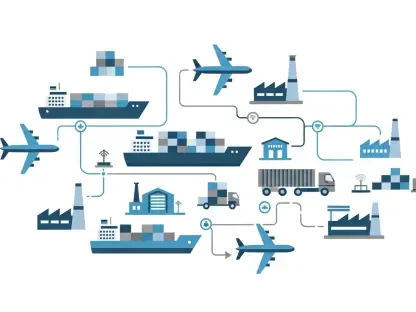Digital transformation is reshaping industries worldwide, and the logistics sector is no exception. DB Schenker, a global logistics leader, is pioneering this shift by partnering with cargo.one. This collaboration aims to significantly enhance DB Schenker’s air transport services, streamlining processes, and expanding its airline connectivity. By doing so, DB Schenker sets a new standard of efficiency and reliability in the industry, addressing various challenges and market demands. In today’s fast-paced logistics landscape, understanding how this digital shift improves DB Schenker’s air transport services is crucial. Let’s delve into the details.
Enhancing Digital Connectivity
DB Schenker’s collaboration with cargo.one is a strategic move to improve digital connectivity with airlines. Initially, the company had access to only nine airlines; however, this new partnership has expanded its reach to over 50 airlines globally. This broad spectrum of connectivity not only allows DB Schenker to tap into a more extensive network of live capacity options and competitive spot rates for air freight services but also fortifies its position as a leader in the logistics industry.
The integration of direct API interfaces with multiple airlines enables seamless data exchange. Real-time data capability is crucial for managing capacity and securing the best rates efficiently. This digital connectivity translates into enhanced service offerings and a superior ability to respond swiftly to market demands. Especially in an industry marked by rapid changes and high customer expectations, such capabilities ensure DB Schenker remains competitive and effective. This enhanced connectivity is more than just an operational upgrade; it paves the way for future innovations and improvements in logistics and freight forwarding.
Streamlining Processes for Efficiency
The digital shift aims to streamline DB Schenker’s processes, making them more efficient and customer-friendly. The collaboration with cargo.one leverages advanced technology to identify suitable capacities and secure competitive rates for ad-hoc shipments quickly. This efficiency is particularly crucial ahead of peak seasons in air transport, where demand spikes and capacity constraints often pose significant challenges.
DB Schenker’s digital infrastructure for air freight encompasses an integrated landscape of six systems, ensuring a seamless customer interface via DB SCHENKER connect. This integration allows customers to access rate offers and track their shipment statuses without any disruptions. The result is a smoother, more user-friendly experience that saves time and improves satisfaction. By automating many functions that were previously manual, the company is also able to reduce the chances of human errors, thus ensuring a higher quality of service.
Meeting Market Demands and Customer Expectations
One of the primary drivers behind this digital shift is the need to meet evolving market demands and customer expectations. The logistics industry is increasingly reliant on digital solutions to manage real-time data and enhance operational efficiency. By adopting these solutions, DB Schenker is aligning itself with industry trends and positioning itself as a forward-thinking leader in the market.
Customers today expect rapid sourcing of air freight capacities and competitive pricing due to the rise in global e-commerce activity and supply chain disruptions. The collaboration with cargo.one allows DB Schenker to promptly address these needs, offering better choices and customized solutions tailored to individual customer requirements. Enhanced connectivity and real-time data management are pivotal in delivering these high-quality services. This customer-centric approach not only improves satisfaction but also fosters long-term loyalty, providing DB Schenker with a significant competitive edge.
Leveraging Strategic Partnerships
Choosing cargo.one as a strategic partner underscores the importance of leveraging external expertise in technological domains. Cargo.one is renowned for its advanced platform, which efficiently manages vast amounts of real-time data. This partnership allows DB Schenker to harness this expertise, driving innovation and improving service delivery.
By integrating cargo.one’s platform, DB Schenker can effectively manage its expanded airline network, ensuring optimal usage of capacity and securing the best market rates. This strategic use of technological advancements not only enhances DB Schenker’s competitive edge but also ensures that they can offer the most efficient and cost-effective solutions to their customers. Such collaborations highlight the growing importance of partnerships in achieving business objectives and innovating within the logistics sector. By leveraging external expertise, DB Schenker accelerates its digital transformation, setting the standard for others in the industry.
Addressing Global Supply Chain Challenges
Digital transformation is rapidly reshaping industries across the globe, with the logistics sector being no exception. One prominent player, DB Schenker, a leading global logistics company, is at the forefront of this change. They have partnered with cargo.one to revolutionize their air transport services. This strategic collaboration is designed to streamline processes, improve efficiency, and broaden airline connectivity. In doing so, DB Schenker aims to set a new standard of reliability and operational excellence in the logistics industry, effectively addressing numerous challenges and meeting evolving market demands.
In today’s fast-paced world of logistics, understanding how digital transformation enhances DB Schenker’s air transport services is essential. The partnership with cargo.one leverages advanced technology to optimize booking processes, offer real-time data insights, and enhance customer experiences. This synergy not only expedites operations but also ensures higher accuracy and transparency. Furthermore, this collaboration allows DB Schenker to respond more agilely to market fluctuations and customer needs, ensuring that they remain competitive in a rapidly evolving industry.









